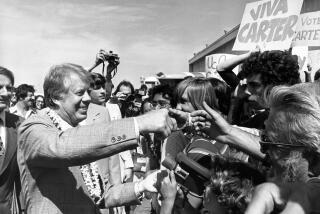Did modern presidential politics start with Aaron Burr?
- Share via
Two hundred years before the contested election of 2000, another contested election pitted a sitting vice president against a president running for a second term, for the only time in U.S. history. I’m talking, of course, about Thomas Jefferson and John Adams.
One of the ironies of that election, though, is that when it was finally resolved in the House of Representatives, the decision was between Jefferson and Aaron Burr. That’s because, in the early days of the republic, presidential voting involved double balloting, in which members of the electoral college selected two candidates; as a result, Jefferson and Burr, who was running to be vice president, ended up with the same number of electoral votes. After the election, the 12th Amendment did away with double balloting, and only one campaign, that of 1824, has subsequently been settled in the House.
Burr is a key figure in Pepperdine University professor Edward J. Larson’s “A Magnificent Catastrophe: The Tumultuous Election of 1800, American’s First Presidential Campaign,” a 2007 book that posits 1800 as the flashpoint from which modern presidential politics begins. It’s a compelling argument, not least for how it traces the rise of political parties — in this case, the Federalists, representing Adams, and Jefferson’s Republicans, a precursor of today’s Democrats — with all the divisiveness and backbiting we’ve come to know.
“Citizens choose your sides,” a New York Federalist newspaper declared in the spring of 1800. “You who are for French notions of government; for the tempestuous sea of anarchy and misrule; for arming the poor against the rich; for fraternizing with the foes of God and man; go to the left and support the leaders, or the dupes, of the anti-federal junto. But you that are sober, industrious, thriving, and happy, give your votes for those men who mean to preserve the union of the states, the purity and vigor of our excellent Constitution, the sacred majesty of the laws, and the holy ordinances of religion.”
If such rhetoric sounds familiar, that’s one of the unexpected pleasures of “A Magnificent Catastrophe.” But there are other, equally compelling parallels. As Larson makes clear, even in 1800, political geography was an essential issue, with swing states (although they weren’t yet called that) such as New York, New Jersey and (yes) Pennsylvania in play.
The situation was so volatile that Pennsylvania Sen. James Ross proposed legislation to investigate “the admissibility or inadmissibility of the votes given by the electors for President and Vice President” by “authoriz[ing] a partisan committee, meeting in secret, to nullify any number of electoral votes and thereby to swing the election as it chose.”
Larson elaborates: “Publicly, the bill’s sponsors claimed that it would simply provide a procedure for weeding out invalid electoral votes, such as those cast either by electors never ‘properly appointed’ or for an ineligible presidential candidate. Privately, they acknowledged that it targeted a particular threat posed by Pennsylvania.”
Although the legislation did not pass, it’s impossible to read about it without recalling Pennsylvania state Rep. Mike Turzai, who declared this last August, “Voter ID, which is going to allow Governor Romney to win the state of Pennsylvania, done” — an echoed voter suppression effort that also failed when Judge Robert Simpson blocked Pennsylvania’s voter ID law earlier this month.
Still, of all the commonalities between 1800 and contemporary politics, none may be as resonant as those provoked by Burr. He was a thoroughly recognizable politician: pragmatic, willing to do anything in the pursuit of power.
Long a figure of both literary and historic interest — think of Gore Vidal’s 1973 novel “Burr” or H.W. Brands’ “The Heartbreak of Aaron Burr,” published earlier this year — he’s remembered now as a dark prince of the republic: the adventurer acquitted of treason, the vice president who killed his longtime rival Alexander Hamilton in a duel.
But the Burr portrayed by Larson is a whip-smart manipulator of public opinion, responsible for delivering New York to Jefferson. In an April 1800 state election, he and the Republicans out-organized Hamilton and the Federalists, engaging in the kind of door-to-door, get-out-the-vote effort that has long since become a political commonplace.
Not only that, he was not shy about expressing his ambitions in an age when most candidates, Jefferson and Adams among them, pretended to be above the fray. As a result, Larson writes, “few politicians fully trusted Burr and many actively disliked him — but no one doubted his influence over local politics in New York City, which then dominated that of its state.”
In the end, Burr was not to be trusted, as the election would show. Tied with Jefferson in the electoral vote count, he played both ends against the middle, publicly pledging his support to the party’s presidential candidate while privately giving the impression that “if elected President, he would serve.”
And yet, if this offers another example of his political mutability — “He took ideologically inconsistent stands on various issues,” Larson tells us, “and even courted Federalist support for a possible run … [for] governor in 1792” — it also suggests just how ahead of his time he truly was. Burr’s politics, after all, are our politics, the politics of expedience, of saying anything to get a vote.
In the wake of last week’s presidential debate, as a different kind of Republican seeks to press his advantage by tacking relentlessly to the center, we would do well to keep that in mind.
ALSO:
David Foster Wallace looked for truth on the campaign trail
The 2012 presidential race shows the long reach of Ayn Rand
Reading the election; What would Norman Mailer say about the 2012 conventions?
More to Read
Sign up for our Book Club newsletter
Get the latest news, events and more from the Los Angeles Times Book Club, and help us get L.A. reading and talking.
You may occasionally receive promotional content from the Los Angeles Times.







